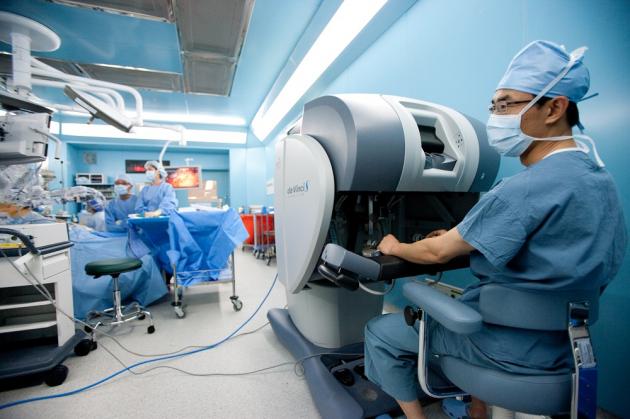Robotic gastrectomy showed better surgical outcomes than laparoscope gastric resection for gastric cancer patients, local researchers said.
Two research teams at Ajou University School of Medicine analyzed the long-term outcomes of robotic gastrectomy and laparoscopic gastrectomy in 2,087 gastric cancer patients who underwent surgery between 2009 and 2017.

The results showed that although robotic surgery took 180.47 minutes on average, 32 minutes longer than laparoscopic surgery’s 148.32 minutes, robotic surgery had less blood loss than laparoscopic surgery (90.44 cc vs. 106.14 cc).
Particularly in the D2 gastrectomy -- resection of both the stomach and all the surrounding lymph nodes in advanced gastric cancer -- robotic surgery harvested more lymph nodes in the supra-pancreatic areas than laparoscopic surgery, the medical school said in a news release on Monday.
The findings support that robotic surgery was better for the D2 gastrectomy than laparoscopic surgery, given that gastric resection, as well as surrounding lymph node resection, is a significant factor in the prognosis of gastric cancer in stage 2 or higher.
The researchers also identified factors that could affect the overall survival of patients, such as the patients’ TNM (Tumor, Node, Metastasis) stage, the number of underlying diseases before surgery, and the level of albumin before surgery. Factors influencing survival without recurrence after gastrectomy included whether the patient had serious complications such as bleeding, leakage, and stenosis.
Also, the study results showed that there was no distinct difference between robotic surgery and laparoscopic surgery groups in long-term survival and recurrence-free survival.

Professor Han Sang-uk of the Department of Surgery at Gastric Cancer Center led one of the research team, Professor Shin Ho-jung of the Department of Acute and critical care surgery headed the other.
“The study confirmed that robotic surgery is less likely to switch to the opening of the abdomen in the middle of the operation, compared to laparoscopic surgery. Robotic surgery had less bleeding from the beginning and showed a relatively superior outcome in lymph node resection in the supra-pancreatic area,” Professor Han said.
Given such merits, robotic surgery will likely be used more widely, not only for early-stage gastric cancer but advanced gastric cancer, which needs a more prudent resection of lymph nodes, he said.
Professor Shin noted that as the latest study identified the advantages of robotic gastrectomy and major factors affecting survival and complications, physicians will be able to treat gastric cancer patients more effectively.
The study was published under the title, “Long-term Comparison of Robotic and Laparoscopic Gastrectomy for Gastric Cancer-A Propensity Score-weighted Analysis of 2084 Consecutive Patients,” in the online issue of Annals of Surgery in March.

